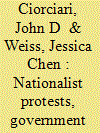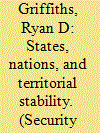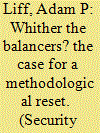|
|
|
Sort Order |
|
|
|
Items / Page
|
|
|
|
|
|
|
| Srl | Item |
| 1 |
ID:
147909


|
|
|
|
|
| Summary/Abstract |
Violence varies in intensity across intrastate political conflicts. This study suggests that interactions between local state agents and nonstate radicals affect the intensity of violence. When contention develops in a community and nonstate actors radicalize, whether or not some local state agents deviate from their institutional role as providers of law and order to support radicals is a crucial feature that explains how some communities experience more violence than others. This argument explains the different trajectories of violence in two neighboring rural districts during the 1971–76 period of the Troubles in Northern Ireland. The major implication of the study is that these interactions affect not only the intensity of violence in particular communities but also the breadth, length, and end of violence in the overall intrastate conflict.
|
|
|
|
|
|
|
|
|
|
|
|
|
|
|
|
| 2 |
ID:
147910


|
|
|
|
|
| Summary/Abstract |
What explains armed-group conduct toward civilians in war? The National Resistance Army (NRA) of Uganda demonstrated notable restraint toward civilians during its wars in northern Uganda in the 1980s, restraint that is puzzling given the overdetermined predictions for mass atrocity under rationalist, identity, and regime-type theories. Instead, the NRA case demonstrates that military culture—the organizational norms underlying combatant socialization—is a primary determinant of armed-group behavior, influencing combatant conduct in ways not conceptualized under existing theories of victimization. This review of the NRA case, based on field interviews with Ugandan military officers and examinations of Ugandan documentary archives, reveals three key points regarding the role of military culture in effecting restraint. First, the NRA case shows that organizational factors like military culture can determine military behavior toward civilians. Second, it reveals that theories of military culture, incorporating both formal and informal mechanisms of combatant socialization, can provide a more complete theoretical account than existing theories of armed-group conduct. Finally, the NRA provides potential hypotheses for mechanisms through which culture influences military behavior. I analyze the effect of culture on the NRA's conduct as a plausibility probe, generating inductive insights drawn from detailed field research to shed light on the organizational drivers of armed-group restraint. The NRA case thus points the way to a reconceptualization of military culture and the role of organizational factors that influence conflict behavior.
|
|
|
|
|
|
|
|
|
|
|
|
|
|
|
|
| 3 |
ID:
147912


|
|
|
|
|
| Summary/Abstract |
While the existing literature emphasizes that elites often have incentives to pander to nationalist sentiment, much less attention has been paid to elite efforts to subdue popular nationalism, either to avoid domestic instability or international escalation. This article examines how different governments respond to nationalist protests and the resulting effects on the risk that interstate disputes will escalate to armed conflict. We argue that government responses to nationalist protests tend to vary in patterned ways across regime types. Nationalist protests present particular dangers in weakly institutionalized democracies, where demonstrations often pose serious threats of instability but are difficult or costly for the government to subdue, tempting or forcing leaders to escalate to appease domestic critics. We illustrate the theory with four cases representing a range of regime types: Vietnam, Cambodia, Thailand, and the Philippines.
|
|
|
|
|
|
|
|
|
|
|
|
|
|
|
|
| 4 |
ID:
147911


|
|
|
|
|
| Summary/Abstract |
How would a hegemonic China shape international norms related to states, nations, and territoriality? Scholars have noted the conflict between the right of minority nations to self-determine and the right of states to maintain their territorial integrity. An unrestricted application of the former would risk considerable state fragmentation; an unconditional acceptance of the latter would condemn stateless nations to a subordinate status. Powerful actors like the United States have attempted to navigate these norms by specifying the conditions under which one norm should take precedence over the other, but such decisions are difficult to make in an international environment that lacks consensus, and the result is an ambiguous international order where conflict is common. I analyze the future of these norms in a Chinese-led international order, explaining why China would champion territorial integrity over self-determination, and why this would be better for territorial stability.
|
|
|
|
|
|
|
|
|
|
|
|
|
|
|
|
| 5 |
ID:
147907


|
|
|
|
|
| Summary/Abstract |
When are states willing to engage in behaviors of little material or strategic value in order to assert their status? This article demonstrates that states are more likely to engage in acts of status assertion if their international standing has been called into question. Such status-challenged states seek opportunities to demonstrate their capabilities as well as their intention to maintain their current status. Status assertions often challenge the status and security of other states, leading these states to engage in more frequent acts of aggression. Evidence for these claims comes from detailed analysis of the Scramble for Africa at the end of the nineteenth century. France and Germany adopted expansionary policies in Africa because their great power status had been called into question. These policy shifts directly led Italy and Britain to adopt expansionary policies, leading to the eventual conquest of 95 percent of the African continent.
|
|
|
|
|
|
|
|
|
|
|
|
|
|
|
|
| 6 |
ID:
147908


|
|
|
|
|
| Summary/Abstract |
Post-Cold War, balancing theory has fallen on “hard times.” A question of crucial importance for 21st-century peace and stability concerns how Asia–Pacific secondary states are responding militarily to China's rise. China's rapid growth, military modernization, and controversial policies vis-à-vis contested space and territories on its periphery make it a prime candidate for counterbalancing behavior. Yet several recent studies claim that secondary states are accommodating, even bandwagoning with, Beijing. This study challenges these claims, attributing them largely to problematic research designs not uncommon in the wider balancing literature. It proposes a methodological corrective, arguing for widespread employment of an alternative analytical framework relying on clearer definitions and explicitly delineated sets of 21st-century-relevant metrics reflecting the myriad ways contemporary militaries enhance their capabilities in response to perceived threats. Applied systematically to original analysis of the contemporary Asia–Pacific, this framework uncovers what existing studies miss—evidence of practically significant and accelerating balancing against China.
|
|
|
|
|
|
|
|
|
|
|
|
|
|
|
|
|
|
|
|
|